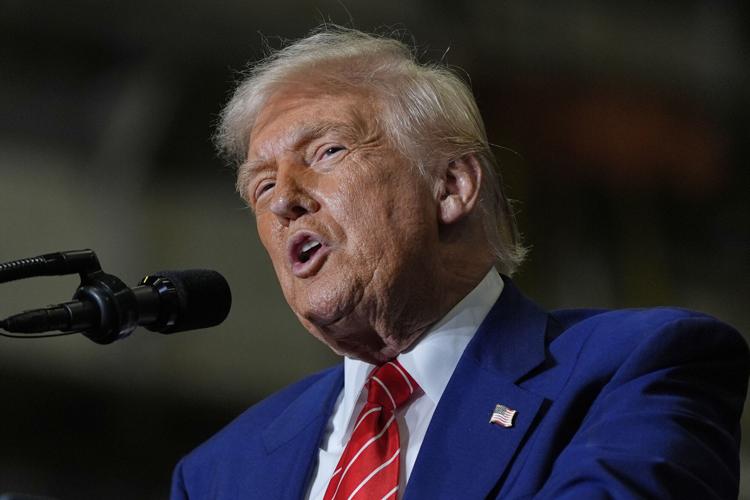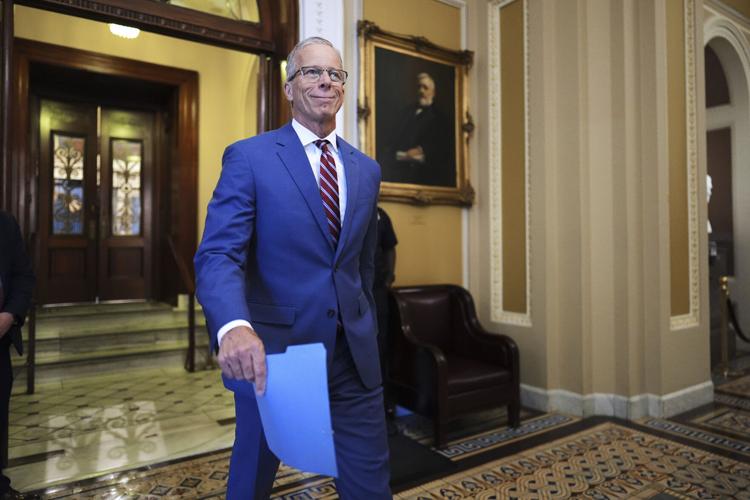WASHINGTON — President Donald Trump wants his bill of tax breaks and spending cuts on his desk to be signed into law by the Fourth of July, and he's pushing the slow-rolling Senate to make it happen sooner rather than later.
Trump met with Senate Majority Leader John Thune at the White House early this week and called senators for one-on-one chats, using both the carrot and stick to nudge, badger and encourage them to act. But it's still a long road ahead for the 1,000-page-plus package.
"His question to me was, How do you think the bill's going to go in the Senate?" Sen. Josh Hawley, R-Mo., said about his call with Trump. "Do you think there's going to be problems?"

President Donald Trump speaks Friday at U.S. Steel Corporation's Mon Valley Works-Irvin plant in West Mifflin, Pa.Â
It's a potentially tumultuous three-week sprint for senators preparing to put their own imprint on the massive Republican package that cleared the House late last month by a single vote. The senators met for weeks behind closed doors, including as they returned to Washington late Monday, to revise the package ahead of what is expected to be a similarly narrow vote in the Senate.
People are also reading…
But Trump's high-octane ally, billionaire Elon Musk, lambasted the package — and those voting for it.
"This massive, outrageous, pork-filled Congressional spending bill is a disgusting abomination," Musk posted on his social media site as some lawmakers expressed reservations about the details. "Shame on those who voted for it: you know you did wrong. You know it."
The legislation would curtail subsidies that benefit Tesla, Musk's electric automaker.
The tech billionaire followed his criticism with a threat aimed at Republicans.
“In November next year, we fire all politicians who betrayed the American people,” he wrote in another post.
Thune, like House Speaker Mike Johnson, has few votes to spare from the Senate's slim, 53-seat GOP majority. Democrats are waging an all-out political assault on GOP proposals to cut Medicaid, food stamps and green energy investments to help pay for more than $4.5 trillion in tax cuts — with many lawmakers being hammered at boisterous town halls back home.

Senate Majority Leader John Thune, R-S.D., walks from the chamber Tuesday after speaking about the reconciliation process to advance President Donald Trump's spending and tax bill at the Capitol in Washington.Â
"It'd be nice if we could have everybody on board to do it, but, you know, individual members are going to stake out their positions," Thune said Tuesday. "But in the end, we have to succeed. Failure's not an option."
At its core, the package seeks to extend the tax cuts approved in 2017, during Trump's first term at the White House, and add new ones the presidents campaigned on, including no taxes on tips and others. It also includes a massive build-up of $350 billion for border security, deportations and national security.
To defray the lost tax revenue to the government and avoid piling onto the nation's $36 trillion debt load, Republicans want reduce federal spending by imposing work requirements for some Americans who rely on government safety net services.
Estimates show 8.6 million people would no longer have health care and almost 4 million would lose Supplemental Nutritional Assistance Program benefits, known as SNAP.
The package also would raise the nation's debt limit by $4 trillion to allow more borrowing to pay the bills.
Senate Democratic Leader Chuck Schumer said Trump's bill "is ugly to its very core."
Schumer, D-N.Y., said Tuesday it's a "lie" that the cuts won't hurt Americans.
"Behind the smoke and mirrors lies a cruel and draconian truth: tax breaks for the ultra-wealthy paid for by gutting health care for millions of Americans," he said.
The nonpartisan Congressional Budget Office is expected to provide an overall analysis soon of the package's impacts on the government balance sheets, particularly rising annual deficits. Republicans are ready to blast those findings from the congressional scorekeeper as flawed.

Sen. Rand Paul, R-Ky., who is opposed to President Donald Trump's spending and tax bill because of the debt-limit increase, does a TV news interview Tuesday at the Capitol in Washington.Â
Trump switched to tougher tactics Tuesday, deriding the holdout Republican senators to get on board.
The president laid into Kentucky Sen. Rand Paul, the libertarian-leaning deficit hawk who made a career of arguing against government spending. Paul wants the package's $4 trillion increase to the debt ceiling out of the bill.
"Rand votes NO on everything, but never has any practical or constructive ideas. His ideas are actually crazy (losers!)." Trump posted.
Paul seemed unfazed. "I like the president, supported the president," the senator said. "But I can't in good conscience give up every principle that I stand for and every principle that I was elected upon."
The July 4th deadline is not only aspirational for the president, it's all but mandatory for his Treasury Department. Treasury Secretary Scott Bessent warned Congress that the nation will run out of money to pay its bills if the debt ceiling, now at $36 trillion, is not lifted by mid-July or early August to allow more borrowing.
Thune acknowledged Tuesday that lifting the debt ceiling is not up for debate.
"It's got to be done," the South Dakota senator said.

Elon Musk attends a news conference Friday with President Donald Trump in the Oval Office of the White House in Washington.Â
The road ahead is also a test for Thune who, like Johnson, is a newer leader in Congress and among the many Republicans adjusting their own priorities with Trump's return to the White House.
While Johnson warned against massive changes to the package, Thune faces demands from his senators for adjustments.
To make most of the tax cuts permanent — particularly the business tax breaks that are the Senate priorities — senators might shave some of Trump's proposed new tax breaks on automobile loans or overtime pay, which are policies less prized by some senators.
Hawley is a among a group of senators, including Maine Sen. Susan Collins and Alaska Sen. Lisa Murkowski, who raised concerns about the Medicaid changes that could boot people from health insurance.


















